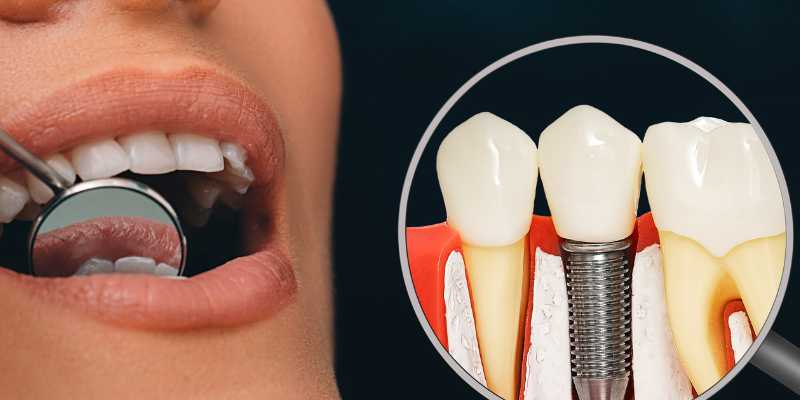Losing one or more teeth can impact much more than just your appearance—it affects your ability to eat, speak, and even your overall oral health. Fortunately, dental implants have revolutionized tooth replacement by offering a permanent, natural-looking, and highly functional solution. Unlike traditional dentures or bridges, dental implants provide a durable foundation that restores both aesthetics and function.
What Are Dental Implants?
Dental implants are titanium posts surgically inserted into the jawbone to serve as artificial tooth roots. Once implanted, they bond with the bone through a process called osseointegration, creating a stable base for a crown, bridge, or denture. This process not only restores the missing tooth but also stimulates bone growth, preventing bone loss and maintaining facial structure. Because the implant integrates directly with the jawbone, it provides exceptional stability and strength, allowing for natural chewing and speaking functions. Unlike other tooth replacement options, implants help preserve the health of surrounding teeth and support overall oral health. This makes dental implants a highly effective and long-lasting solution for tooth loss.
Why Choose Dental Implants?
1. Long-Term Durability
Dental implants are designed to last many years—often a lifetime—with proper care. Unlike dentures, which may need frequent adjustments or replacements, implants provide a permanent, reliable solution that feels like your natural teeth.
2. Natural Look and Feel
Because implants fuse directly with the jawbone, they function like natural teeth. The custom-made crowns are crafted to match your surrounding teeth, making implants virtually indistinguishable from the rest of your smile.
3. Preserves Jawbone Health
When a tooth is lost, the jawbone begins to deteriorate due to lack of stimulation. Implants mimic natural tooth roots and stimulate the bone, preventing this deterioration and preserving your jaw’s strength and shape.
4. Improved Oral Function
Implants restore full biting force, allowing you to eat all your favorite foods without worry. They also help maintain clear speech, which can sometimes be affected by missing teeth or ill-fitting dentures.
5. Protects Adjacent Teeth
Unlike traditional bridges, which require the alteration of neighboring teeth for support, implants stand independently. This helps protect the health of your natural teeth and preserves your overall smile.
The Dental Implant Process
The process of getting dental implants is thorough and typically spans several months to ensure optimal results.
Step 1: Consultation and Assessment
Your dentist will perform a comprehensive exam, including X-rays or 3D imaging, to assess your jawbone’s condition and determine if you’re a good candidate for implants.
Step 2: Implant Placement
Under local anesthesia, the titanium post is surgically placed into your jawbone. This procedure is usually comfortable, and any discomfort afterward can be managed with pain medication.
Step 3: Osseointegration and Healing
Over the next several months, the implant integrates with the jawbone, forming a strong foundation for your new tooth.
Step 4: Abutment and Crown Placement
Once healed, an abutment (connector) is attached to the implant, and a custom crown is placed on top. The crown is designed to match your natural teeth in color, shape, and size.

Who Is a Good Candidate?
Most healthy adults can be candidates for dental implants. Key factors include:
Sufficient jawbone density
Healthy gums free of periodontal disease
Commitment to good oral hygiene
Non-smoker status or willingness to quit during healing
If bone loss is present, bone grafting procedures can often restore sufficient bone to support implants.
Caring for Your Dental Implants
Dental implants require the same daily care as natural teeth:
Brush twice daily with a soft-bristle toothbrush
Floss daily using implant-friendly tools if needed
Attend regular dental checkups and cleanings
Avoid habits like smoking or chewing hard objects that could damage the implant
With proper care, implants can provide decades of reliable function and beauty.
Common Myths About Dental Implants
Myth 1: Implant surgery is painful.
Most patients report minimal discomfort during and after the procedure, often less than a tooth extraction.
Myth 2: Implants are prohibitively expensive.
While initial costs may be higher, implants are a cost-effective long-term investment compared to dentures or bridges that need frequent replacement.
Myth 3: Implants require special care.
Implants are cared for much like natural teeth and do not require special cleaning solutions.
Final Thoughts
Dental implants have become the gold standard for replacing missing teeth due to their durability, natural appearance, and numerous health benefits. They restore your ability to eat, speak, and smile with confidence while protecting your oral health for years to come. Unlike other options, implants help maintain jawbone integrity, preventing bone loss and preserving your facial structure. With proper care, they offer a reliable, long-lasting solution that can improve your quality of life significantly. If you’re considering tooth replacement options, consulting with a dental professional can help you determine if implants are the best choice for your unique needs. Modern advances in implant dentistry have made the process more comfortable and accessible than ever, making it easier to regain a strong, healthy smile that lasts a lifetime.








